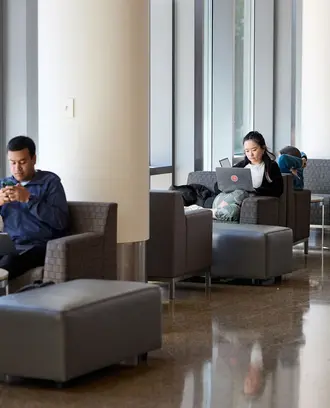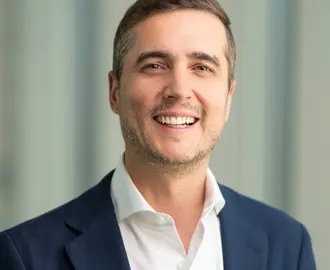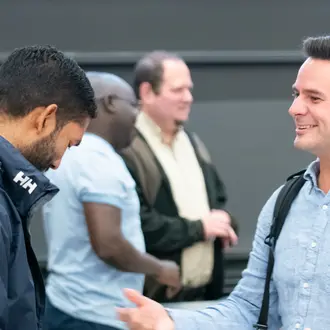Santiago Guzman and Joseph Peteul, members of the MIT Sloan Fellows MBA Class of 2018, met in a study group during the program and have since launched Cap8, a revolutionary fin-tech venture that leverages scientific methodology to build investment solutions. Originally from Monterrey, Mexico, Santiago served as Director of Equity Capital Markets at Citigroup in Mexico before his year at MIT. Deputy CEO of YellowKorner, Joseph founded the company’s North American business following a decade in investment banking and finance in his hometown, Paris. Read more about their venture and how they met in the MIT Sloan Fellows MBA.
Exciting news about your new venture. Is it true that Cap8 started in an MIT Sloan Fellows study group back in 2017?
Joseph Peteul, SFMBA '18
Joseph: Exactly right. The very first person I met in the program was Santiago. Little did I know he would become one of the most important people in my life. We were assigned to the same study group, but it was no ordinary group. There were five of us, and we’d come to the program from all over the world—Oman, Japan, South Korea, Mexico, and France.
These groups are designed to create friction so people learn how to collaborate across cultures and industries. In our case, it proved to be a fusional relationship. We each brought something very different to the group and the mix was magic. We created a very strong bond, enduring to this day. We still chat quite often on the very same WhatsApp group we used to organize homework.
Santiago: Yes, we just stuck together. We were Study Group 8. So, when Joe and I decided to start a company, we called it Cap8 in homage to the group. Joe and I were on the same business analytics track and had many classes together. Every time we had the opportunity to expand our views, we’d review new analytical tools that we were discovering at MIT—like system dynamics. We’d look at their implications for other subjects of interest to us, like macroeconomics and markets.
We realized if we applied all these new tools and all this new knowledge to finance, we could expand our own views into revolutionary thinking. So, we started to explore these ideas in classrooms and class projects, envisioning a company that could run with these ideas. We decided that we’d give it a shot after graduation. If it didn’t work out within six months, at least it would be an important learning experience. Three months ahead of schedule, we had a nice prototype working, and we hit the road to raise funding. Cap8 was born and is going strong.
In many ways, Cap8 is more than a business to you both. It’s a personal quest to change the world of finance.
Santiago Guzman, SFMBA '18
Santiago: Well, yes. We both have long experience in the financial industry, Joe in Europe and me in the Americas. At MIT, we learned about the opportunities in existing financial structures that can be enhanced using technology. It would be unwieldy to try out these experiments within a big organization, so we decided to start a company rooted in our ideas and values. We would build a sound, rigorously tested theory based on scientific evidence, then scale it up.
Joseph: We envisioned our ideal company as something wholly unique at the intersection of finance, analytics, system dynamics, macroeconomics, and tech—and we advanced our knowledge of all those topics at MIT. Our solution can assess the market environment and position a portfolio in a very adaptive manner so that we can control it at a very granular level. Markets have been changing over the last 20 or 30 years because of technology. Our approach takes that evolution into account.
Santiago: Financial markets are dynamic systems, systems evolving because of innovation in stock exchanges, technology, and global markets. You see a tweet on your phone, and you get a sense of what’s happening in China. You can trade from your smart phone anywhere you happen to be. All these things are changing the way financial markets function, particularly when you compare all these new dynamics to the state of things two or three decades ago. Joe and I believe having all this information can contribute to a more efficient model. Our work is to try to put a name to it, articulate it, and make it viable.
Joseph: It is, as you said, a very personal approach to what we think is the future of asset management—using analytical tools like machine learning to inform the decision-making process from a fundamental point of view. We are truly augmenting human capabilities. Machines have important flaws. They don’t understand context and concepts, but in combination with a human expert at the architecture level, it’s very powerful and takes the emotional component out of decision-making. We also wanted to layer on our own set of core values that are non-negotiable for anybody interacting with Cap8: be rooted in science, rationality, integrity, diversity, and open-mindedness. We were able to attract strong talents to our team because of this value proposition.
Were you able to rely on the MIT Sloan faculty in building this enterprise?
Santiago: We had long, fruitful conversations with faculty. Duncan Simester, NTU Professor of Marketing, really encouraged us to develop this idea. He’s been incredibly helpful during the whole process and has been very involved.
Joseph: Duncan always has the Sloan Fellows at heart. Athanasios Orphanides, Professor of the Practice of Global Economics and Management has also been pivotal. He’s helped us with macroeconomic thinking and an understanding of the central banking decision-making process, which has proven to be essential to understanding markets these days. Any opportunity we get to benefit from their thinking and feedback, we jump on it. Even if we’re no longer students, they’re there for us.
Santiago: John Sterman, director of the MIT System Dynamics Group, really helped us integrate systems thinking into what we were doing. We talked with faculty focused on AI, too. We took all the questions that people were asking and formulated a hypothesis that was distinct. Because we were the only people articulating it, we decided we needed to submit our research for peer review. We just published an article in the Journal of Portfolio Management to show the financial world the extent to which the model has been examined intellectually. It’s important to show the financial markets that this is a viable idea that merits attention.
What other resources did you tap at or beyond MIT that helped you further your idea?
Joseph: MIT has created a remarkable ecosystem that really nurtures and encourages entrepreneurship. We had very insightful interactions with Bill Aulet and the Martin Trust Center for MIT Entrepreneurship. We participated in a mentorship program with MIT Venture Mentoring Service, which matches entrepreneurs with a team of seasoned mentors. We also met with Jinane Abounadi, executive director of MIT Sandbox, who was incredibly helpful to us at the beginning. These interactions caused us to challenge ourselves and forced us to push our ideas further and refine them. As a Sloan Fellow, you come to realize the value of an ecosystem like the Kendall-to-Harvard corridor, which is very rich, diverse, and stimulating.
Santiago: In the end, it’s really all about the people you meet here. Sometimes, it’s just serendipity—random people you meet who unexpectedly give you great ideas. Some of those people have 30 to 40 years of experience in fields that are essential to our concept. The Nobel Prize-winning professor who shares what he’s seen and heard and learned. His knowledge network becomes our knowledge network. And of course, the famous Sloan Fellows network had been incredibly valuable. When you graduate, you have a lifelong bond with the Fellows from previous years. Joe and I connected with a Fellow at a bank in Europe. He graduated in 2009 and immediately picked up the phone, happy to help.
Joseph: But right here in Cambridge, year in and year out, we meet people who make us think differently. That’s one of the reasons we decided to stay local and launch Cap8. We want to keep those connections going long-term.



